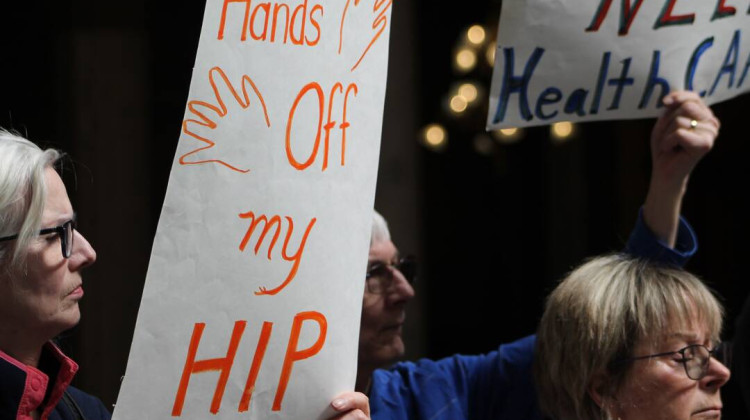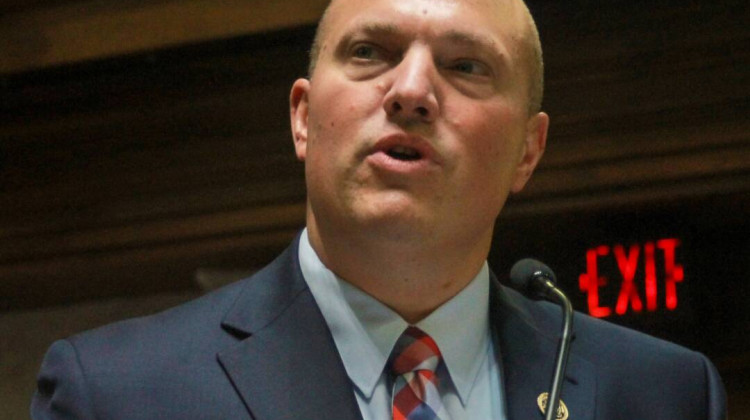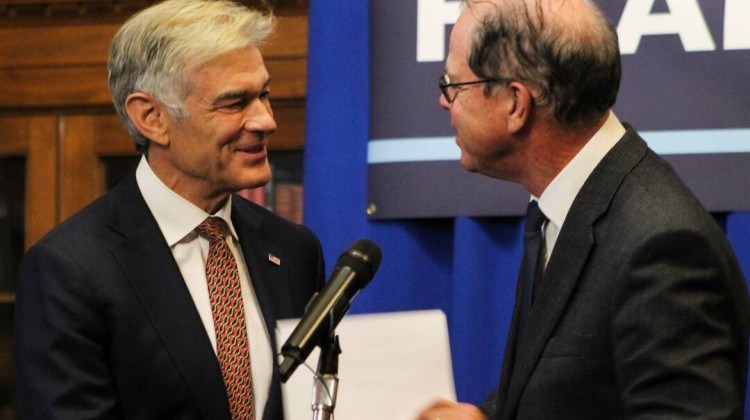
Brittany Combs is seen delivering clean needles and other supplies to a member of Scott County's needle exchange program.
-- Photo: Seth Herald/Side Effects
AUSTIN, Ind. -- Four days a week, public health nurse Brittany Combs drives her SUV around the small town of Austin, Indiana, handing out clean needles to injection drug users and talking to people about going to rehab.
It’s a task that can be rewarding — when one of her customers finally wants help to get off drugs — and a bit agonizing, because there’s often not a rehab bed ready for them.
“They’re ready and they’re ready now,” says Combs. “But they get so frustrated by all the hoops they have to jump through, and the waiting and the waiting.”
It’s been a year since Gov. Mike Pence declared a public health emergency in response to the historic HIV outbreak in Scott County, Ind., spread by injection drug use. The state estimates that there are about 500 people who abuse drugs in Austin, which has a population of about 4,200, and the number of those infected with HIV has grown to 190.
Pence’s emergency declaration allowed Scott County to set up a needle exchange to help curb the spread of HIV and other infections. Outside groups contributed supplies and expertise in Austin. For example, AIDS Healthcare Foundation helped establish a clinic to treat people diagnosed with HIV.
But residents who want help with their addiction still face major hurdles.
Since the beginning of last year, only 69 Scott County residents have gone into the inpatient rehab program run by the community mental health center, LifeSpring—and that includes the people who didn’t finish. LifeSpring is the only facility in the whole region with state-funded beds, and it only has 18. Many Austin residents lack insurance or the means to pay for rehab out of pocket.
Right now, the wait is five to seven weeks to get into rehab at LifeSpring, which is about 45 minutes away. Combs often sees people who change their minds while they wait, falling back into their old crowds and old habits.
“I get frustrated. We still have all these people that want help and we can’t get them help,” says Combs.
The state put money toward a small outpatient clinic offering counseling and group therapy in Austin, which started operating in August. But the number of treatment beds hasn’t increased, despite growing attention on the opioid epidemic. “That’s an important part of the treatment continuum that certainly needs to get improved,” says Kevin Moore, director of Indiana’s Division of Mental Health and Addiction.
Lack of beds is just one barrier to getting people into successful recovery, says Andy Chambers, an addiction psychiatrist who worked in Scott County last fall. He says the county also needs more doctors with expertise in addiction, who can prescribe medications for it.
Chambers says there’s an established body of evidence that medications such as methadone and buprenorphine help keep people from abusing drugs, and they’re now standard practice in addiction medicine.
But for Austin residents, the nearest methadone clinic is a county away. And a psychiatrist with LifeSpring told me the organization only has two people that can legally prescribe buprenorphine for the whole six-county region. They can only prescribe to 130 patients at a time, and those patients often often need to stay on buprenorphine for long periods of time.
Chambers compares treating addiction without those medications to trying to run an emergency room without and EKG machine.
“There’s no way that would be acceptable,” says Chambers. “So a treatment system that cannot offer or does not offer medication treatment of opioid addiction is not performing at an acceptable standard of care in this country.”
Nurse Brittany Combs sees this problem play out with her patients. People often tell her that they’ve gone back to abusing drugs because they can’t get a prescription for buprenorphine.
“I had one last night, this woman came up to our van,” she recalls. “She’s been clean for 90 days and she got needles last night to start using again.”
Combs thinks that the people who want to go to rehab or start on addiction medications, should be able to do that immediately to try to get their addiction under control.
Afterall, addiction is what caused the HIV outbreak.She says people who are still abusing drugs will not stick to their medications like they should, and could continue to spread the virus. “We have to get the addiction problem fixed before we can manage the HIV problem,” says Combs.
She’s grateful for the change she’s seen so far in Austin, but she says the town still needs more help.
“We’ve come pretty far, but we still have long way to go,” she says.
This story was originally posted at Side Effects Public Media, a collaborative health reporting project based at WFYI in Indianapolis. Jake Harper can be reached at 317-614-0482 or jharper@wfyi.org. Follow him @jkhrpr.
 DONATE
DONATE






 Support WFYI. We can't do it without you.
Support WFYI. We can't do it without you.